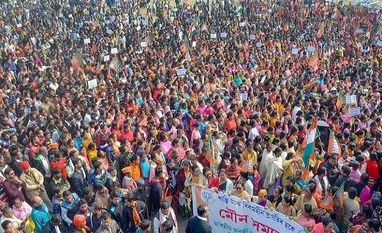The fracas over the Citizenship Amendment Act (CAA) and the National Register of Citizens (NRC) offers more compelling evidence of this regime’s tin ear for the infinite variety that is Indian multiculturalism. That the Modi-Shah grand plan for a Muslim-mukt nation has boomeranged is, however, only part of the story. A closer look at the anti-CAA/NRC protest suggests they were far from monolithic and have given impetus to dormant sub-nationalisms with risky consequences for India.
In mainland India, the protests converged on the anti-Muslim element embedded in the law and the registration exercise. In Jharkhand, with its 27 per cent tribal population, voters have signalled their dissatisfaction with the NRC process with the impossibly high bar for proof of citizenship it has set. In the north-east, the principle grievance is the prospect of distinctive ethnicity being swamped by Bengali Hindus via the CAA/NRC process (assuming the NRC process ejects Bengali Muslims). The last is particularly ironic since the Bill that was defeated in January was tweaked to accommodate the concerns of these states in the latest version. Accordingly, tribal areas in the north-east were largely roped off from the provisions of the new law.
The fact that different groups have different problems with the CAA/NRC also contain the possibilities of Indians turning against Indians in the not-so-distant future. In the north-east, Bengalis, whether Hindu or Muslim, who have been rooted in the north-east for aeons, face the very real danger of becoming targets of ethnic aggression all over again — in Assam, the threats have restarted. The warning shot across the Bharatiya Janata Party’s (BJP’s) bow, in fact, came from Sikkimese footballer-turned-politician Bhaichung Bhutia who feared a cultural swamping of his state — which was muscled into the Indian Union by Indira Gandhi in 1975. Everybody is tactfully pointing to Bangladeshi infiltration as the Fear Factor, but when linguistic cultures supersede borders, the stage is set for ethnic violence. The BJP has long made it clear that all pro-Muslims can go to Pakistan. Now, the demand that all Bengalis should go to Bangladesh is no less possible.
This worrying thing about this nascent sub-nationalism is that it is likely to intensify if economic growth does not pick up and job opportunities narrow. Mr Modi does not need to delve into the mists of history for evidence — only as far as the year of the global financial crisis.
Thus in 2008, the country was witness to the unedifying spectacle of panicked Indian citizens from UP and Bihar fleeing India’s financial capital after being set upon by Maharashtra Navnirman Sena (MNS) goons who demanded that the state only employ Maharashtrians.
In 2012, when the Indian economy started stalling, we beheld thousands of Indian citizens from the north-east fleeing the city that the media so erroneously describes as India’s Silicon Valley after threats of annihilation circulated on social media.
In May this year, viral videos showed local political thugs attack vendors because they were from Kashmir and were, by some twisted logic, terrorists. Now we have that state shorn of its special status so that mainland Indians can buy land there and, according to some crudely sexist politicians, marry Kashmiri women. This grand integration strategy has resulted in the region, now two Union Territories, being under lock-down since August 5, its leaders under house arrest and internet access lifted only intermittently. A high-profile investor summit scheduled in Srinagar in October was postponed and then finally held in New Delhi.
The endgame to such sub-nationalism is depressingly evident in Andhra Pradesh, where Chief Minister Y S Jagan Mohan Reddy has made it mandatory for existing and upcoming industries — whether in the public, joint of private sector — in the state to reserve 75 per cent of the jobs for locals. The state, controversially bifurcated in 2014, is the first to make such a stipulation. It is a matter of time before politicians in other states latch on to the populist value of this policy.
The state, which is moving aggressively and hopefully towards a bright new future with a spanking new capital, is likely to rue this reservation policy. In Maharashtra in 2008, as thousands of small and medium factories were emptied of their workers from UP and Bihar, component supplies to industry majors such as Mahindra & Mahindra dwindled and the construction business stalled. In Bengaluru, the spread of hate-filled social media posts caused such a precipitate departure of north-easterners that the stations were clogged and thousands of small businesses, especially in the booming services sector, found themselves bereft of staff. The situation was serious enough for the state home minister to visit the railway stations to allay fears.
Had Mr Reddy chose to consult any of the investors who he is hopeful of attracting to this state, they could have set him to rights about the folly of his identity politics. Businesses, at least those that want to compete globally, need to prioritise talent over social and regional provenance. It would be hard to argue that Andhraites are intrinsically more talented than other Indians as to be worthy of such exclusivity of opportunities. As the MNS learned to its cost in Maharashtra, the private sector casts its net wide to attract the most cost-effective labour.
It is unclear from the prime minister’s Sunday speech where the citizenship debate is headed. But if he really wants the upheavals to dissipate, he only needs to heed the timeless advice from Bill Clinton’s 1992 presidential campaign: “The economy,…”.
Unlock 30+ premium stories daily hand-picked by our editors, across devices on browser and app.
Pick your 5 favourite companies, get a daily email with all news updates on them.
Full access to our intuitive epaper - clip, save, share articles from any device; newspaper archives from 2006.
Preferential invites to Business Standard events.
Curated newsletters on markets, personal finance, policy & politics, start-ups, technology, and more.
)